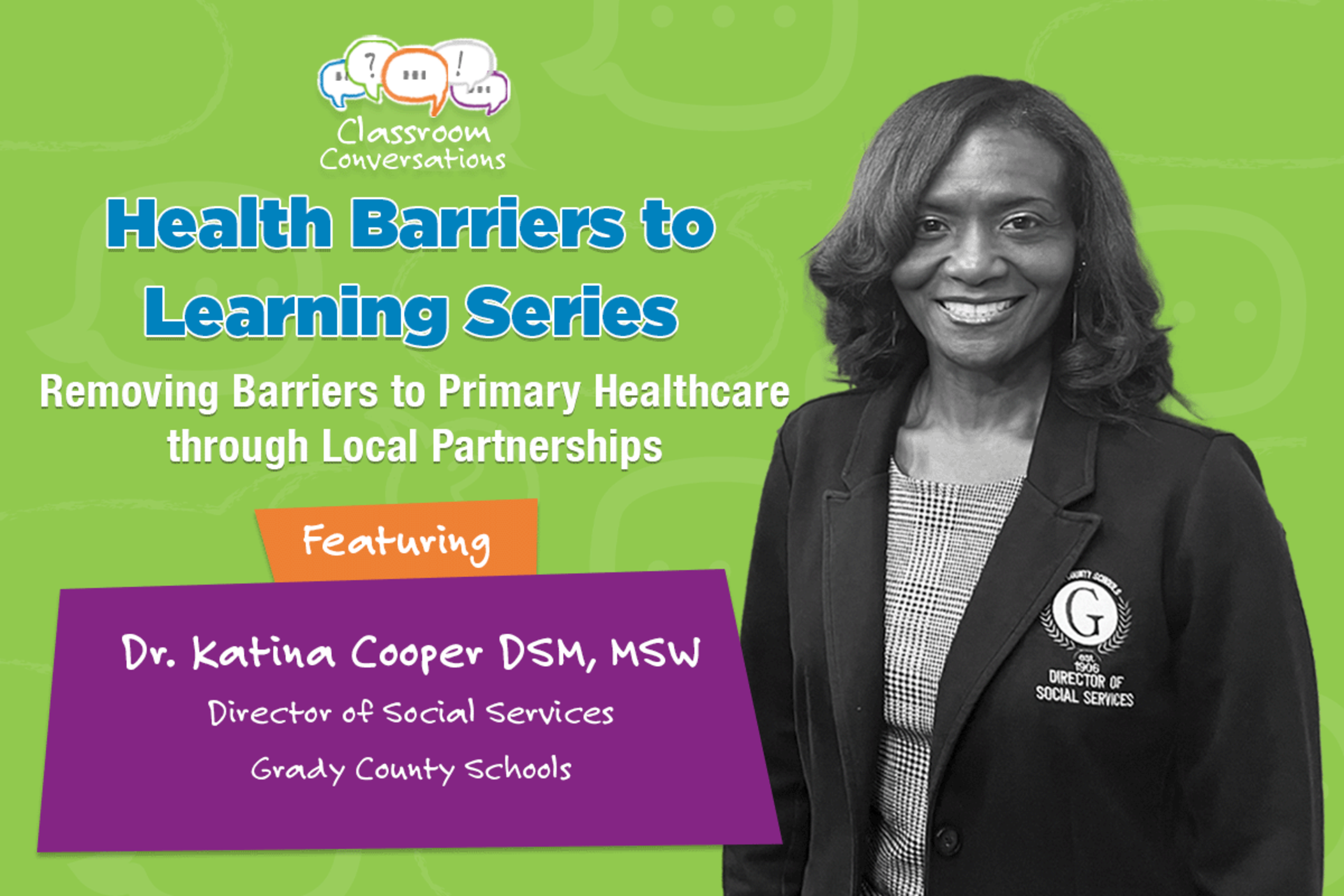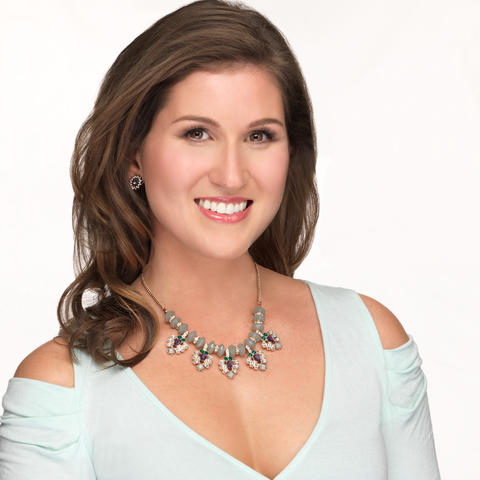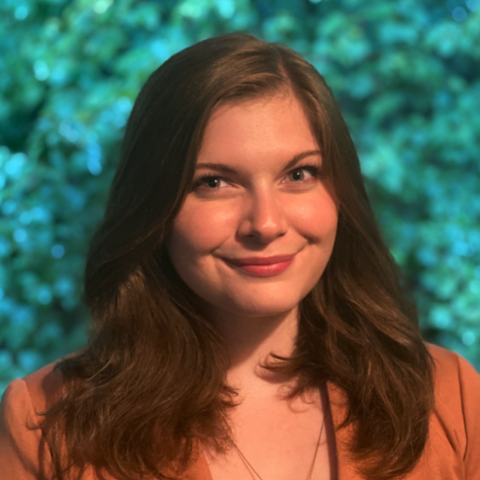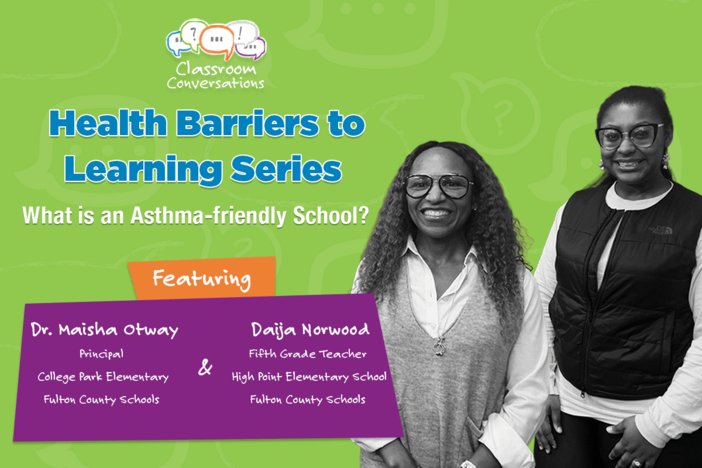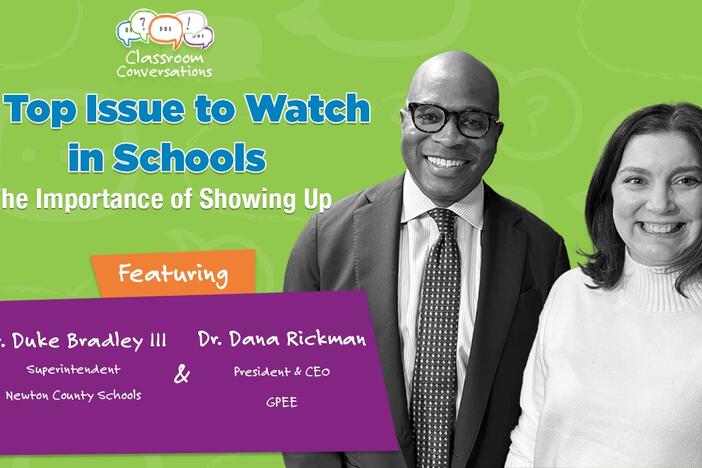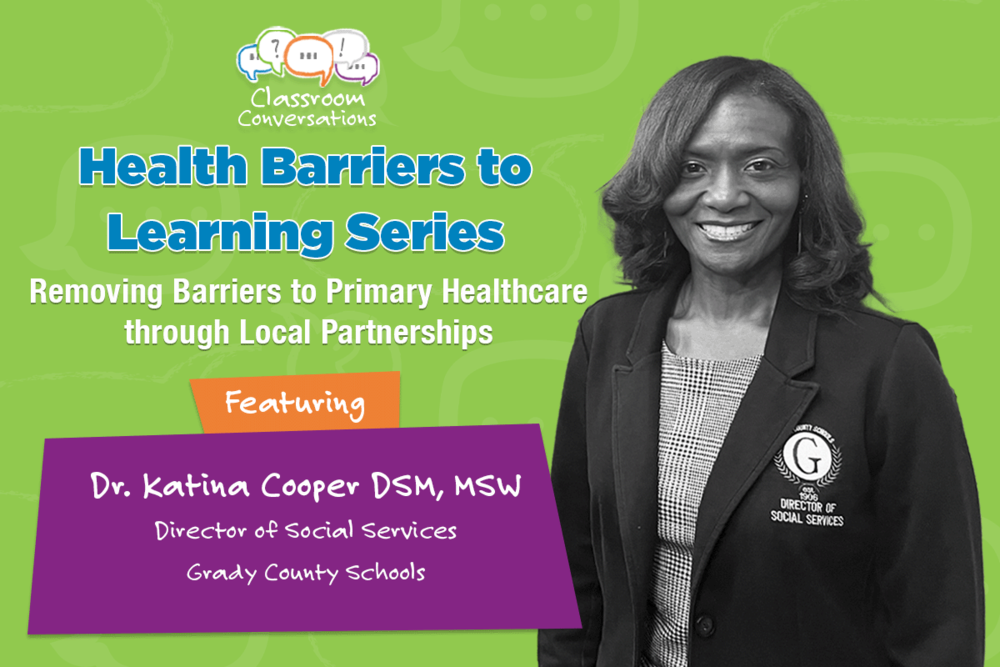
Section Branding
Header Content
Episode 605: Health Barriers to Learning Series: Removing Barriers to Primary Healthcare through Local Partnerships
Primary Content
In this installment of our Health Barriers to Learning series, we offer an uplifting tale of local healthcare partnerships providing resources that help student health and learning flourish. Join us in conversations with Dr. Katina Cooper of Grady County Schools to learn more.

In this installment of our Health Barriers to Learning series, we offer an uplifting tale of local healthcare partnerships providing resources that help student health and learning flourish. Join us in conversations with Dr. Katina Cooper of Grady County Schools to learn more.
TRANSCRIPT
Ashley Mengwasser: Hello there. Welcome to Classroom Conversations. It's a great week to be an educator in Georgia. The Classroom Conversations podcast series presented by education content mavens, Georgia DOE and GPB. Georgia Public Broadcasting is a place for educators to share and learn. I hope you find what you're listening for today. Things are peachy keen for my vantage point at GPB Studios in Atlanta as we jump into a story about Peach State Health Plan and Schools. I'm host Ashley Mengwasser, but for the purpose of this episode, let's just call me the narrator. This story borders on fairy tale, seeming too wonderful to be true. For centuries even ahead of the written word, fairy tales have beguiled listeners with their trademark features. There's always an element of magic, a wilderness, or a natural setting, a few archetypal characters. You've got to have a villain, a hero, and a helper, and a customary opener, which you'll recognize in three, two... Once upon a time in the wilderness setting of Southwest Georgia, Peach State Health Plan identified a large sample of students enrolled in Medicaid and Grady County School District that had not met with a primary care physician in recent years. Then in came Phoebe Putney Health System from Albany, Georgia, our stories hero, to partner with Grady County Schools and provide primary care services to that group of students who now receive care on the school's campus. How in the world? This is where our story's helper enters, Dr. Katina Cooper, a social worker by trade. Dr. Cooper is Director of Social Services for Grady County School District. She uses her background in social work to seize this rare opportunity to help students receive essential health services from Phoebe Putney Health while staying in school. Magic, am I right? Please meet my guest all the way from Southwest Georgia, Katina Cooper. Hi, Dr. Cooper.
Dr. Katina Cooper: Good morning. How are you?
Ashley Mengwasser: I'm great. How are you?
Dr. Katina Cooper: Excited to be here. So, excited.
Ashley Mengwasser: Does it feel like you're living in a fairy tale? Because I feel that way.
Dr. Katina Cooper: Yes, always.
Ashley Mengwasser: Always.
Dr. Katina Cooper: I have to be.
Ashley Mengwasser: I want some of what you're having. I love this jacket. Describe it to me.
Dr. Katina Cooper: What it is just a jacket with a logo with our logo company, Ken Young, and he created our logo and also my credentials and also my names.
Ashley Mengwasser: Your credentials are on your chest?
Dr. Katina Cooper: Yes.
Ashley Mengwasser: Director of Social Services.
Dr. Katina Cooper: Not Superwoman, but it is next to it.
Ashley Mengwasser: You are as far as I'm concerned. I feel like I'm hanging with Dr. Cooper today. Did you ever watch that show, the '90s sitcom, Hanging with Mr. Cooper?
Dr. Katina Cooper: Yes, I did.
Ashley Mengwasser: I actually worked with Mark Curry, the comedian before.
Dr. Katina Cooper: Awesome.
Ashley Mengwasser: Fascinating guy. Really funny. But you're my Mr. Cooper. You're my Dr. Cooper. You did drive to go back to our fairy tale theme from a land far, far away to be here today, Grady County in Cairo, is it?
Dr. Katina Cooper: Yes, Cairo, Georgia.
Ashley Mengwasser: How long was that drive?
Dr. Katina Cooper: It's about three and a half hours.
Ashley Mengwasser: Tell us about Cairo.
Dr. Katina Cooper: Oh, my goodness. Well, it's known for being syrup maker. So, different schools might have bulldog as their mascot or the jackets. Syrup maker, that's only one.
Ashley Mengwasser: The syrup maker.
Dr. Katina Cooper: Because they're known for cane syrup in the early 1900s. So, there were companies that were there that produced syrup there. So, it is known for making syrup back in the day.
Ashley Mengwasser: Oh, that's a little formidable. I don't think I'd mess with the syrup maker, just going to tell you. So, Grady County, what's the population there?
Dr. Katina Cooper: Population in 2020 was like 10,000. When I looked up recently, it dropped a little to 9,900, but it's still within that vicinity.
Ashley Mengwasser: Okay. Yeah, very small rural.
Dr. Katina Cooper: Very small rural area.
Ashley Mengwasser: How many schools are you serving?
Dr. Katina Cooper: I serve six schools, but normally we had seven. We close one but with six schools and we have an alternative school. I'm all over the place.
Ashley Mengwasser: You are all over the place.
Dr. Katina Cooper: Yes, I am.
Ashley Mengwasser: You love this county though. You told me that there-
Dr. Katina Cooper: I love this county.
Ashley Mengwasser: The culture, tell me about that.
Dr. Katina Cooper: Well, I live in Thomasville but I've been there since 2008 in January. So, I adopted it as my home and the community there is phenomenal. Everyone knows each other. There's local businesses. You have local restaurants that everybody patronize, so it's a tight knit area that people are willing to help each other.
Ashley Mengwasser: Which is the basis of the story that we're telling today. 2008, that's 17 years now. What was your path to first becoming a social worker?
Dr. Katina Cooper: Initially, I was not a social worker. I was going to be a nurse. Yes. It switched in between, but when I got my bachelor's in sociology, I was like, "Hmm, I like this."
Ashley Mengwasser: I like this.
Dr. Katina Cooper: I went and got my masters and I said, "I like this a little bit more," and then took it another step and got my doctorate in social work.
Ashley Mengwasser: Yes, Dr. Cooper. What year was it when you first became a social worker?
Dr. Katina Cooper: Well, 1996 when I finished sociology and when I went into got my master's of social work, that was 2004. So, running that time, but I still worked in that area.
Ashley Mengwasser: Now present day as Director of Social Services in Grady County, what are your roles and responsibilities?
Dr. Katina Cooper: Well, one of my roles is most to handle all the business of social workers that's there and I have only one that's under me. So, anything that has to do with social work, that is me. I also am on the Board of Family Connections of the county. So, have you ever heard of Family Connections? I'm on the board here. So, they provide services or resources for the community. So, I go to the meetings, I do all of that. I'm also the homeless liaison. So, I'm there and foster care point of contact.
Ashley Mengwasser: That's amazing.
Dr. Katina Cooper: Whatever role the superintendent needs for me to be and do, I will do that also.
Ashley Mengwasser: You will put one of those six hats on.
Dr. Katina Cooper: Yes.
Ashley Mengwasser: To really shock our audience, you actually have a house for social services in your system.
Dr. Katina Cooper: The Maker's House.
Ashley Mengwasser: What is the Maker's House?
Dr. Katina Cooper: The Maker's House, oh, my gosh. It was a blessing to have. What it does, it provides a place for the services like the mobile unit that we do if our therapist that we have with our APECS Program, which gives our therapy, the school-based mental health. If they need somewhere to write their notes, that is the place to go. If I have donations, that's the place to house it. Whatever the need is, that's what it will be.
Ashley Mengwasser: Which also sounds magical.
Dr. Katina Cooper: It is.
Ashley Mengwasser: This is just a house. What property is it on?
Dr. Katina Cooper: It's across the street, matter of fact, from one of the elementary schools. So it's near the school system itself.
Ashley Mengwasser: Awesome. That is for social services only?
Dr. Katina Cooper: Social services only.
Ashley Mengwasser: Wonderful. Well, then there's Dr. Cooper and then there's Katina, you. What are your special interests? Tell me about you.
Dr. Katina Cooper: I'm an outdoors person. I love the beach. I love to hear the waves clapping. I like outside. Anything that involves outside, that's me.
Ashley Mengwasser: Yeah. You said you have bird houses?
Dr. Katina Cooper: Yes. I love to watch the different birds come and eat. I do battle with the squirrels every now and then.
Ashley Mengwasser: Tell me about it.
Dr. Katina Cooper: I battle with them.
Ashley Mengwasser: I swear they work for the Russian government.
Dr. Katina Cooper: They work for so much-
Ashley Mengwasser: Spies.
Dr. Katina Cooper: I even give them pecans. They don't even want what I give them to distract them from my birds. But yes, I do see. It's very calming to see the beautiful birds just to land, to eat. That's a calming peaceful thing for me too.
Ashley Mengwasser: And you said you like to work with your hands?
Dr. Katina Cooper: Yes. I'm not a good planter, but I'm good pulling the weeds out of bushes and various little things. So, I like that thing. I love to use my hands. So, it's exciting to me.
Ashley Mengwasser: That's so on theme for a social worker, pulling weeds, because you guys are improvers and edifiers.
Dr. Katina Cooper: Yeah, but it's not in place. You have to pull it out-
Ashley Mengwasser: That's right.
Dr. Katina Cooper: ... and put something that has to belong.
Ashley Mengwasser: Something workable there. Oh, that's so good. We're definitely going to go deeper into that. Well, social workers are very knowledgeable and they're uniquely connected to communities. They're such a resource. So, let's just say we could start and ask your school social worker trend, which would be awesome. How much better off would our school systems be? What questions do you wish people would ask you more?
Dr. Katina Cooper: What do I do?
Ashley Mengwasser: Oh yeah.
Dr. Katina Cooper: Matter of fact, my dissertation was about the barriers of school social work practice. A lot of people really don't have an idea what school social workers do and sometimes they get us confused with DFCS and those other roles. But what do I do as a social worker?
Ashley Mengwasser: Clear that up for us.
Dr. Katina Cooper: What I do as a social worker is I eliminate barriers that hinder students from receiving education. Whether it's utilities might be off, I give you those resources. I find those resources. Sometimes I knock on doors to get those resources, especially when you're in rural Georgia and you're in an area where the places that we may have might be out of funding. So, you have to be creative in finding those resources. We are here to help students and support and to encourage. We are that liaison between the school and the home.
Ashley Mengwasser: Absolutely.
Dr. Katina Cooper: So we are there.
Ashley Mengwasser: As if our fairy tale doesn't have enough metaphors, let's just add some more. So, even the term social worker, you are by nature a social person, building relationships with community partners. There's a social piece and then the worker, I haven't known you long, but I know that you are out there actively advocating for students. You are turning over the leaf to make that barrier erased for them. We're going to hear about that in today's story. So, thank you for all you do. Are there any other questions that you wish community members would come to you for?
Dr. Katina Cooper: Do you need more social workers for the school system?
Ashley Mengwasser: Now, we're not that magical. You would like to grow your team itself.
Dr. Katina Cooper: Yes. Yes, very much so.
Ashley Mengwasser: That's a very fair goal. What do you want to say about being the director of social services in this day and age, in a time like this?
Dr. Katina Cooper: You have to network. You have to make those connections. It's important to go to other places to make connections with other people and advocate on the behalf of your county because that's what I do when I go to conferences. I have to give agencies I didn't think about maybe we might need to relocate or bring therapists in that area where there are no therapists because there are no brick and mortar like mental health buildings there. They can really utilize that area to help our families that's in need that need those services.
Ashley Mengwasser: You make a great point. Grady is one of 159 Georgia counties. So, there are a lot of different counties and different situations with very different needs, which I think is where our story can begin. This is our entry point here about the Peach State connection with Phoebe Putney Health System. How did this partnership first come about? Tell me everything.
Dr. Katina Cooper: Oh, the partnership, I received a call. I received a call from the coordinator at the time from Phoebe and he was telling me about the services, how it would benefit the area, and how many students they located through Peach State that needed.
Ashley Mengwasser: So these are Peach State members already.
Dr. Katina Cooper: They're already members of Peach State. Peach State identified those students and the collaboration between Peach State and Phoebe is that they coordinate those two things in order to bring the mobile units to the counties. So, Grady County is not the only county that has the mobile unit.
Ashley Mengwasser: Phoebe Putney is in Albany.
Dr. Katina Cooper: It's in Albany, about an hour away from Cairo.
Ashley Mengwasser: So different county.
Dr. Katina Cooper: A very different county and a very good distance.
Ashley Mengwasser: They're coming into yours with... I love this part of the story. I was stunned to learn that the vehicle by which this is delivered is an actual vehicle. You mentioned Phoebe Putney brings in these mobile units. What are they doing?
Dr. Katina Cooper: The mobile unit is huge. I went inside one of them. It's a doctor's office on wheels.
Ashley Mengwasser: Cool.
Dr. Katina Cooper: Very much so. I was like, "Wow, I didn't know this could happen." So it is very nice. What it has is a nurse practitioner and about two or three medical assistants and then there's a driver. So, when the mobile unit comes, they are ready. The appointment's already set. They already made. Peach State already do that part. They make those appointments. They even do follow up appointments with those students that have been identified.
Ashley Mengwasser: There you go.
Dr. Katina Cooper: So excited.
Ashley Mengwasser: So when they called you and they said, "Hey, we have identified these folks that haven't seen a primary care physician in a while," what do they say next?
Dr. Katina Cooper: What days are you available that we could come to your county?
Ashley Mengwasser: You're kidding me.
Dr. Katina Cooper: They come to Maker's House. That's where everything happens.
Ashley Mengwasser: It was that easy.
Dr. Katina Cooper: That easy. I have to rearrange my schedule so that that can happen. So, I want that to happen. It starts at 8:00 and sometimes end about 3:00.
Ashley Mengwasser: You said when this first happened, this struck me, you sat there and observed for two days. What did you observe over those first two days of this?
Dr. Katina Cooper: Well, for me, I wanted to make sure everybody on the list was seen. So, what I did was I took the initiative and went through and just made text messages, "Hey, you have appointment today with the mobile unit." Some of them was aware and make sure they knew what the area, where the Maker's House was, so that they could get there.
Ashley Mengwasser: There you go.
Dr. Katina Cooper: At every appointment, we had about 90% that came. About one or two that didn't show.
Ashley Mengwasser: Who is this for? What students does this serve?
Dr. Katina Cooper: It serves students from elementary to high school.
Ashley Mengwasser: All grades.
Dr. Katina Cooper: All grades. All grades. That's who Peach State identifies. Once they identify those students, those students, they come to the Maker's House for that particular day for that appointment. It's just like a well care appointment. So, they come in, they get that checkup. They do physical examinations, check their heart rate. They do blood pressure, they take the vision, they take the hearing. They even do preventive measure. They even look at behavioral problems, anxiety, depression. They do screenings. So, it's very helpful because what happens where I come into play is maybe there might be a local business, a doctor, medical, and I can connect those people together.
Ashley Mengwasser: There she is with those resources.
Dr. Katina Cooper: Connection, you remember connection is the main key.
Ashley Mengwasser: So the purpose of this really is to get the student reconnected on a health plan to keep them engaged in their learning. Then what happens after the mobile unit? Do they see the mobile unit every time or there's another connection made?
Dr. Katina Cooper: When the mobile unit is done, if they have to have a follow-up, they will make a follow-up appointment. What they want to do is make sure those students are linked with a physician, a local physician.
Ashley Mengwasser: They get a referral and onward they go. All right, so we're saving these people from the brink of being lost. Peach State said, "Hey, I've identified these students in need. Let's see them at Grady County," which is wild.
Dr. Katina Cooper: Yes. They give me the list beforehand. I get their list beforehand because I want to make sure those students come. So, I do help in that aspect. I want to be sure they're there to make those appointments.
Ashley Mengwasser: You get them to that appointment.
Dr. Katina Cooper: Yes. Also, what I do for those parents, sometimes the parents need excuses. I produce excuses for them to take to their jobs if they need.
Ashley Mengwasser: Yeah, I want to talk about all of that. Walk us through the process that the family experiences. So, once they have been identified as a candidate for services, you get your list. What is happening for the parents of the student?
Dr. Katina Cooper: One thing about the parents, they still can work. They don't have to take the whole day off. Only during that particular time they could go sign them out. Once they sign them out, they go to the mobile unit. Once they finished with the mobile unit, they could take them back to school and they go back to work.
Ashley Mengwasser: Wow.
Dr. Katina Cooper: They don't lose time off the job unless they want to take the whole day off.
Ashley Mengwasser: So you contact them as soon as you get that list.
Dr. Katina Cooper: Once I get that list, I do.
Ashley Mengwasser: You get their permission. Once they say okay?
Dr. Katina Cooper: The permission and everything is taking place prior because Peach State has taken care of that. What I do is just a follow-up and say, "Hey, just a reminder, your appointment's today or at this time." So I want to make sure that medical need is met for that particular student.
Ashley Mengwasser: What impact has this had on students and families?
Dr. Katina Cooper: The first thing, as I mentioned, they didn't lose much time from school. Instruction time is not lost and the school is aware because especially the south side, they can walk from one place to the next. Even from the other schools, that instruction time is not lost. They could go back to school and they could go back to work. So, that's one of the main keys we look at. The number two, establishing a medical doctor and it's important for our students to have that.
Ashley Mengwasser: Absolutely. You already mentioned you're saving parents that important work time, that earned income time that they need as well. I remember when I was in school, did you ever experience this? Sometimes a student would be out and would be at a doctor's visit, but nobody would know. Then there was the question, have you seen this student? Well, I was at the doctor, but it wasn't communicated. So, you make a great point. The school knows where their student is because this is an at school activity technically.
Dr. Katina Cooper: Yes.
Ashley Mengwasser: What a benefit. What other impacts have you seen for the students who are receiving this care? What's their reaction to it?
Dr. Katina Cooper: A lot of them it is less stressful because you come into the Maker's House, you're close to the school, you're not in a doctor's office. They're more laid back because when they come in, they can just sit there and wait and don't wait long. It's just like appointment. They go in, they do what they need to do, and they leave. They're happy.
Ashley Mengwasser: They go right back to class.
Dr. Katina Cooper: Some of them don't want to go back, but they go back.
Ashley Mengwasser: I'd want to hang out on the mobile unit if I were them.
Dr. Katina Cooper: But they go back.
Ashley Mengwasser: Do you think this opportunity has improved attendance and other student behaviors in the classroom?
Dr. Katina Cooper: I think so because one of the things they do look at is screening for behavioral problems. They screen for anxiety. Maybe there's something that we might have not seen at school level. Maybe that's something they disclose to them and they do make referrals. So, that is a benefit in itself for us to have them being a part of doing the wellness exams for their students.
Ashley Mengwasser: What additional things do you facilitate on your end, Dr. Cooper, that enables the success of this and removes those barriers for families? You mentioned you'll help with application forms and things like that. Take me through all of those little tasks that you're clearing out of the way of these families.
Dr. Katina Cooper: Well, one of the things that I make access for them to come because that's one of the key things. Phoebe look for days to come because they have already worked it out with Peach State. They look for days to come. They have Peach State representatives. They have a bilingual person that comes because our population is heavily Hispanic mix. So, when they come, we have someone that can communicate with our families.
Ashley Mengwasser: Look at that.
Dr. Katina Cooper: I thought that was the most awesome thing for that service.
Ashley Mengwasser: That is awesome. So, that's one thing. What else are you doing in terms of your tasks?
Dr. Katina Cooper: Oh, for my tasks, what I do too is for instance, if they need a dentist. At our school system, we have dental care, so maybe they didn't get a chance to get the application to do our dental work, have a child's mouth, just putting that plug in. So, maybe they didn't get a chance to do that. I can get them linked to that service. We have services in the school system that can accommodate our students so that they don't have to leave.
Ashley Mengwasser: You're doing all that. You mentioned providing excuses for work. Tell me about that.
Dr. Katina Cooper: Sometimes our families, they may be working in the fields. So, I do provide note excuses for our parents. So, on our letterhead, letting them know that they had the appointment that day. If they need any more information, they can feel free to give me a call.
Ashley Mengwasser: They could be there, which is such a wonderful benefit. Does the community know about this mobile unit thing and how has that been received?
Dr. Katina Cooper: Our community does know and they are excited about it because it doesn't take away from our physicians there. It links our students to the physicians there. So, it doesn't take away. It adds.
Ashley Mengwasser: Yeah. Do any of your local physicians make doctors' calls just come on out and say hi?
Dr. Katina Cooper: Well, not yet. Not yet.
Ashley Mengwasser: Feels like they could.
Dr. Katina Cooper: Not yet, but they can.
Ashley Mengwasser: That would be a relationship opportunity.
Dr. Katina Cooper: Yes.
Ashley Mengwasser: Resources can be limited in schools, we know, time, money.
Dr. Katina Cooper: I don't like that word limited.
Ashley Mengwasser: I know, it's not a fun word. How is Grady County paying for the program if we could tackle that first?
Dr. Katina Cooper: Sure. We don't pay.
Ashley Mengwasser: Well, I love the sound of that.
Dr. Katina Cooper: I love the word free. I love the word free. They provide the service. The only thing we provide is space.
Ashley Mengwasser: I see that. The Maker's House.
Dr. Katina Cooper: Yes.
Ashley Mengwasser: Okay. What about in terms of time? How are administrator and educator time affected by this?
Dr. Katina Cooper: It's not. It's in a neutral ground. We're not interrupting classroom time or anything because the only person that's there school-wise is myself. Those students, once they go in, they go in, they do the appointment, they go back to their classroom and get back into the class, what they were doing.
Ashley Mengwasser: What is the communication with the educator? Just that so-and-so has an appointment today.
Dr. Katina Cooper: Educator may not know that they have an appointment, but the principals, I do send emails out to let them know that these students may have appointments today with the mobile unit. Once they go in, they go in and they come out and that's it.
Ashley Mengwasser: Then they return to class.
Dr. Katina Cooper: Then they return to class.
Ashley Mengwasser: So for educators who were in rural school districts like yours, what advice would you offer someone looking to connect their students to health services like this? Not everybody's going to get that phone call from Peach State or Phoebe Putney saying, "Hey, we'll be there when you're available." What would you recommend if they want to make better connections with students?
Dr. Katina Cooper: I would recommend them talking with their school social worker or school counselor because they know the resources. They go to the conferences and hear of the different things. That's the first step I would suggest to them to do because they would be able to link the school system, get the principals in, get the buy-in from the schools. So, that that services can become a part of their school system.
Ashley Mengwasser: Which is what you do. You are such a link and you talk a lot about resources, Dr. Cooper. You have those connections. There are those services. You've got a lot of great taglines. I love the ones you've dropped today. What services do social workers generally have access to that you just want our educators listening to know, the things that you could help educators and students and families with?
Dr. Katina Cooper: One of the things, school-based mental health. We have access to that through APECS. Sometimes there are other counties that's not with APECS that is willing, other therapy agencies that's willing to come into schools. So, that's a conversation you need to have with the superintendent. Again, let me plug my superintendent in. Very supportive of the services that we have, Dr. McPhee, very supportive of the service we have. He's very hands-on. He come to the meetings if I need them in the meetings to discuss with whatever I need to discuss with the providers. So, it is important to have that buy-in and is important to just present it to your superintendent.
Ashley Mengwasser: What was your example earlier in the episode about there's something at home? Was it utilities or something at home? You could even help with that. I mean that blew my mind.
Dr. Katina Cooper: Yes. If there are needs in a community, there are utilities, there are places that help fund that assist with the utilities. Even community leaders, you got churches that's willing to help. So, as a social worker, you could go out and advocate and say, "Hey, I have a family that's in need. If that person doesn't, there's another person."
Ashley Mengwasser: There you go. There's an access point for almost anything.
Dr. Katina Cooper: Those connections, that C-word.
Ashley Mengwasser: Yeah, especially with you in charge over there. The C-word is Dr. Cooper.
Dr. Katina Cooper: I don't like the word limited. I always remember that.
Ashley Mengwasser: I think that's a good quote. You would love the movie Wicked if you have not seen that yet. The beginning of Defying Gravity is unlimited. That's who you want to be. What makes you proud of your system, your district, your students having participated in this partnership?
Dr. Katina Cooper: Oh, I think by them, it's getting that health need met. A lot of students that haven't gotten a chance. Parents are busy. Some of them work and that opportunity gives them an opportunity for just the well-care, get their heart rate checked, get the ears or get the eyes and the vision, getting those essential needs met.
Ashley Mengwasser: Get the peace of mind thanks to Peach State of knowing you have a clean bill of health and can return to the classroom and learn.
Dr. Katina Cooper: Yes. They also do vaccines. I want to put that in. So, they also do vaccines. If they have to update that information with the Georgia Registry of Immunization, they will do that. So, they also offer vaccines too.
Ashley Mengwasser: So pretty much any basic primary care visit service you can receive on the mobile health unit?
Dr. Katina Cooper: Yes.
Ashley Mengwasser: Does it have a name, this mobile unit?
Dr. Katina Cooper: Phoebe Wellness Unit.
Ashley Mengwasser: Okay, Phoebe.
Dr. Katina Cooper: They do it for various counties. It's just not Grady County. If you have a space, they're willing to do it at any county for our students once they identify through Peach State.
Ashley Mengwasser: You told me that this whole thing, that fortuitous phone call, it all began in 2023.
Dr. Katina Cooper: That is where it began.
Ashley Mengwasser: It hasn't even been that long. Looking back, what are your thoughts so far?
Dr. Katina Cooper: I'm glad, I was like, "Okay, yes, let's try it. Let's do it. Yes."
Ashley Mengwasser: You're not risk averse, are you, Dr. Cooper?
Dr. Katina Cooper: We take it.
Ashley Mengwasser: Yeah, just take it on and succeed.
Dr. Katina Cooper: Yes.
Ashley Mengwasser: Congratulations with all you've done. Is there anything you want to add?
Dr. Katina Cooper: No. Thank you for the opportunity being here just to discuss rural Georgia. Rural Georgia, love you. So, I love my place. I love the place where I work at. So, I'm very excited that I'm here to discuss the things that we're doing. I just want to always tell rural areas, there is an opportunity for something to happen in your county. There are students that have chronic conditions. When those chronic conditions, we do offer services, which is the hospital homebound, but those students are not able to do work. So, we want to support and encourage those students to have alternative education opportunities for those students to still be successful even though they're going through what they're going through.
Ashley Mengwasser: Know what's available. Just be open to community partnerships.
Dr. Katina Cooper: Be open.
Ashley Mengwasser: Even if you get a random phone call.
Dr. Katina Cooper: Be open.
Ashley Mengwasser: Well, thank you for being a helper in the fairy tale story, Dr. Cooper. Most fairy tales have an underlying message, a moral of the story, if you will. What is that message for you?
Dr. Katina Cooper: Oh, the C-word, community, connections. I love those two C-words.
Ashley Mengwasser: Community I think is the moral of this story.
Dr. Katina Cooper: Yes, it is.
Ashley Mengwasser: Thank you for leaving Cairo to come and sit with me, Dr. Cooper.
Dr. Katina Cooper: Thank you.
Ashley Mengwasser: I've enjoyed talking with you. My takeaway audience very much in keeping with the mission of Peach State actually, is that by doggedly pursuing the health of each individual, we can elevate the wellness of an entire community, right, Dr. Cooper?
Dr. Katina Cooper: Yeah.
Ashley Mengwasser: I knew you'd agree. This is where the narrator concludes with and they lived healthily ever after. You're a great educator and you can help elevate the wellness in your district by passing this story forward, the oral tradition way, for this is how to keep a tale alive. A similar partnership success story is yours for the making because every school system deserves its fairy tale ending. I'm Ashley for Classroom Conversations. Goodbye for now. Funding for Classroom Conversations is made possible through the School Climate Transformation Grant.
In this installment of our Health Barriers to Learning series, we offer an uplifting tale of local healthcare partnerships providing resources that help student health and learning flourish. Join us in conversations with Dr. Katina Cooper of Grady County Schools to learn more.

